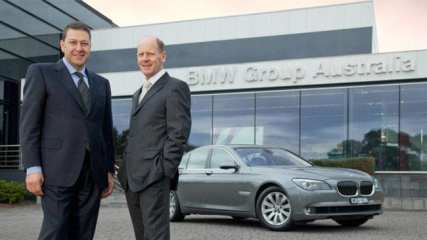BMW 730d 2010 News

Luxury brands build networks
Read the article
By Neil Dowling · 09 Sep 2010
The spread of the dealer network aims to keep up with demand caused by a booming population and Australia's strong economy. Within two years, BMW will see $40 million spent on new or refurbished outlets as it shoots for 50 national dealerships.These include a second dealership in Perth ($15 million), expanded Doncaster (Victoria) premises ($10 million), a North Shore Sydney franchise ($8 million) and a new dealer at Tweed Heads. The Perth dealership, to be built this year by the existing franchisee, is in the city's expanding northern suburbs.BMW Australia managing director Stavros Yallouridis says the expansion reflects the mechandising concept that takes the product closer to the buyer. "We are, to a degree, a product for the impulsive buyer," he says."We have to go to the buyer and that redefines the distribution of our products. In many cases, as we expand our products with smaller cars, we have to be in city areas that demand small cars in order to sell to our target market."Yallouridis says the car market was aiming for record highs and, in BMW's case, highlighted by the 1-Series, X1, 5-Series and 7-Series."The X3 comes in next year and there's the 1-Series hatch and coupe, so sales will expand further," he says.The Audi Centre in Perth is more than doubling its floor area, taking over a neighbouring property in the high-end car retail suburb of Osborne Park. The suburb also hosts Ferrari, Lamborghini, Lexus, Jaguar and Mercedes-Benz.The additional building will accommodate the new 26-car showroom - effectively 2.5 times bigger than present - to display one of each of Audi's models. Dealer principal David Collins says the investment of about $15 million was necessary."The customers demand it and we desperately need the space because of the growth in Audi sales," he says. "In 2004 we had 120 new car sales. Now we have 1050."Audi's sales are higher than BMW's when you take out the SUVs. "I've ordered 250 units of the A1 for 2011 because of demand." Collins says the Q5 was "the most successful car I've ever been involved with".He says it reflects the growing trend of buyers seeking to downsize their cars yet retain quality and luxury. BMW has recorded a 10.4 per cent national sales growth year-to-date and, with global sales this calendar year of 775,000, has surpassed Mercedes-Benz (735,000) and Audi (726,000).It has since January sold 1156 of its baby X1 SUV - now its third most popular single-body seller after the 3-Series (3326) and X5 (1955) - for 2 per cent of Australia's passenger-car market.Audi has 1.7 per cent of the car market, primed by sales year-to-date of 1458 A3s and 2521 A4s, and Mercedes-Benz has 2.6 per cent thanks primarily to its E-Class stranglehold of the $70,000-plus large luxury car sector and the robust 4242 C-Class sales.

Diesels shatter the class barrier
Read the article
By Paul Gover · 29 Apr 2008
Audi already has adiesel A8, Mercedes-Benz is about to introduce an S-Class diesel and BMW is committed to a Seven Series diesel by the first half of 2010.All three are chasing the holy grail ofreduced emissions, improved fuel economy and better performance in cars that are usually painted as lardy,inefficient and overpriced.They're also cashing in on the growing demand for diesel in Australia, as well as countering the hybrid push from Lexus with its impressive LS 600h.Audi set the engine pace with its A8, but the S-Class and Seven Series will raise the showroom pace with cars that sell in far greater numbers.The Benz S320 TDI will deliver 174kW and 540Nm, up from 165kW and 510Nm in the 350 V6 diesel motor.“This is a good way to maintain our place in the luxury class. We have almost 50 per cent share with the S-Class already,” Mercedes-Benz spokesman Peter Fedayev says.“We have customer demand, and we've been able to get the car for Australia with this new engine.“The car will be in showrooms later this month. It's the same engine as in the ML and GL 320, but upgraded with a bit more power and torque.”Fedayev says Benz is doing well with its diesels, although its growth isn't as dramatic as that of Volkswagen or BMW.“At the end of last year, it was 21.8per cent overall, and it's still growing,” he says.“This is very much a function of thegrowing demand for high-tech diesels. People are waking up to it inpassenger cars.”BMW's Seven Series diesel is expected early in 2010. It will take BMW that long to gear up for the new engine because of the likely demand for top-end petrol powerplants.“It will be a green flagship, and high-performance,” BMW Australia chief Guenther Seemann says.“Having a diesel doesn't mean wecreate a cheap entry model.“We'll bring in only the high-performance diesel, because even in this target group it's not a matter of the price of petrol — it's a matter of showing social responsibility on environmental issues.”Seemann says the Seven Series will have a development of the twin-turbo diesel six already used in the X5 off-roader, giving BMW a greater share ofthe upper-luxury class.“The segment in Australia is about 1000 cars, so if I sell 450 cars I'm the world champion. Today, we are selling about 200,” he says.Seemann believes Australians will continue to demand more diesels, andnot just in compact economy cars.“Last year, 21 per cent of our cars were diesel. But since we introduced efficient dynamics this year, in January we had 40 per cent diesel sales,” he says.“If that trend continues, and the discussion continues in regard to petrol prices, then it will be very big. It's about 35 per cent for the quarter.“Our most popular diesel is the 520d, not just because of consumption but also value for money. And, of the diesel buyers, 60 per cent were non-BMW owners joining us.”




